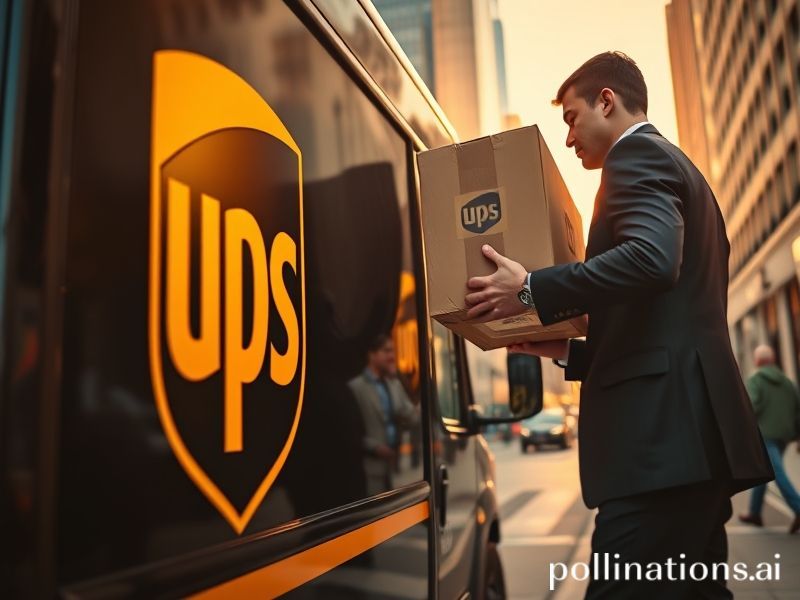Global Economy Caught in a Brown Box: What UPS Stock Says About Our World Order
Brown Boxes, Red Ink, and Brownian Motion: UPS Stock as the World’s Dark Crystal
By Our Correspondent Somewhere Between Frankfurt Flughafen and a Manila Suburb
News that UPS shares recently slipped 3 % in pre-market trading—after the company trimmed its full-year revenue forecast—should, in any sane century, concern only logistics nerds and the handful of analysts who still bother to read footnotes. Yet in 2024, the ripple was felt from Incheon to Inca country, reminding us that the global economy is held together not by duct tape or treaties, but by the humble cardboard box and the sweaty hero who hurls it over your gate at 2 p.m. sharp.
Let’s zoom out. UPS is less a courier than a cardiogram of planetary consumption; every beep on its tracking page is the sound of another rainforest coughing politely. When management blames “weak Asian export volumes,” what they really mean is that the great binge of the Chinese middle class has developed a hangover—possibly from reading too many headlines about property developers defaulting faster than a teenager’s New Year’s resolution. Fewer iPhones ordered, fewer pallets of sneakers flown from Shenzhen to Sheboygan, and suddenly a stock ticker in Atlanta starts resembling the Richter readout after a minor quake in Tashkent.
Europe, meanwhile, watches through the half-empty glass of its own recession fears. German factory orders are down; Italian wineries can’t ship the surplus prosecco; even the Dutch, who invented both capitalism and questionable snack foods, are hoarding cash like it’s tulip bulbs circa 1637. The result: fewer premium “expedited” parcels routed through Cologne, more half-empty 747s burning kerosene across the Atlantic for the sheer existential hell of it. UPS’s margins feel the pinch, and European fund managers—already traumatized by their own green-energy portfolio—dump the stock faster than you can say “Inflationsausgleichsprämie.”
But the real kicker is in the Global South, where the promise of e-commerce was supposed to lift millions out of poverty and into a fluorescent-lit future of customer-service headsets. In Lagos, motorcycle couriers for Jumia—Africa’s would-be Amazon—now idle under overpasses, scrolling Twitter for news of Silicon Valley layoffs that might, in some convoluted butterfly-effect way, decide whether they eat today. When UPS sneezes, the gig-worker catches pneumonia, and the World Bank politely revises yet another poverty-line spreadsheet.
Ironically, the brown-uniformed army in the United States, fresh from a narrowly averted strike that felt like a Netflix limited series nobody asked for, now finds itself in the odd position of being both victim and beneficiary. Fewer parcels mean fewer overtime shifts, but also fewer hernias. Management’s pivot to “operational efficiency”—corporate argot for making drivers sprint like caffeinated hamsters—has so far meant Wall Street remains only mildly apoplectic rather than full-on cardiac. Analysts talk of “pricing discipline,” which translates to charging you fourteen dollars to move a paperback from Brooklyn to Hoboken while the planet quietly combusts.
And what of the broader significance? In an age when AI prophets promise disembodied utopia, it turns out we still need actual humans to move atoms from A to B. Every dip in UPS stock is a reminder that the digital revolution runs on diesel, lithium, and the aching lumbar regions of people whose names we’ll never know. The market may recover tomorrow; consumption, like a horror-movie villain, always gets up for one last scare. Yet each earnings revision etches a faint line on the tombstone of the Anthropocene: “Here lies a species that could stream 4K video to an Antarctic research station but couldn’t figure out how to mail a birthday card without turbo-charging the apocalypse.”
So when you next tap “track package,” spare a moment for the grand tragicomedy encoded in that innocuous brown rectangle. Somewhere in Mumbai, a warehouse picker counts down the minutes to payday; in Memphis, a pilot calculates fuel reserves; and in a glass tower overlooking Central Park, a portfolio manager updates a risk model whose variables include typhoon seasonality and the price of breakfast burritos in Tijuana. All of them—us—are merely subcontractors in the planetary relay race whose baton is running out of track.
UPS stock may rebound by Friday; the climate, alas, does not do quarterly guidance.







